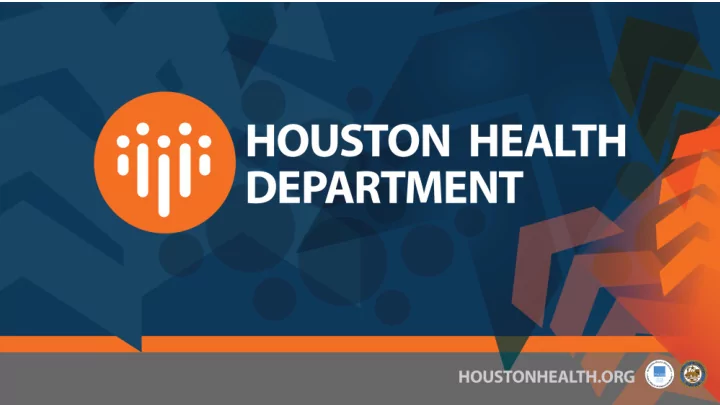

Innovative Strategy to Increase Identification of Infants Born to Chronic Hepatitis B Mothers Presented by Essi M. Havor MSN, RN, PHNA-BC Houston Health Department, Immunization Bureau May 1, 2019
Learning Objectives At the end of the session, participants will learn about and have opportunity to discuss…. Ø challenges to the identification of HBsAg-positive women and their infants Ø promising practices to increase identification of HBsAg-positive women and their infants Ø lessons learned and next steps
Part 1: Overview of Perinatal Hepatitis B Prevention Program
INTRODUCTION ~ 25,000 infants are born to women chronically infected with hepatitis B every year ~ 10,000 of these infants would become chronically infected without timely PEP ~ 2,500 would die of liver failure or liver cancer as early as age 10 ~1,000 newborns are infected annually Healthy People 2020 target (among infants and children aged 1 to 24 months) : 400 cases 2007 baseline: 799 Source : Ko SC, Fan L, Smith EA, Fenlon N, Koneru AK, Murphy TV. Estimated Annual Perinatal Hepatitis B Virus Infections in the United States, 2000–2009. Journal of the Pediatric Infectious Diseases Society. 2014 Dec 18:piu115.
Hepatitis B Surveillance in Texas q Acute HBV must be reported within 1 week q Chronic HBV is NOT reportable except: q Prenatal & Delivery, reportable within 1 week q Perinatal (<24 months), reportable within 1 work day q Not all hospitals report electronically 6
PRO Texas Perinatal Hepatitis B Prevention Program Manual (2016)
Part 2: City of Houston 2016 Program Evaluation
City of Houston (COH) Program Background q Funded by CDC since 1991 q City of Houston residents only q CDC Estimates: q 255 – 422 infants born to HBsAg-positive mothers in 2015 q 90% of the estimated births to HBsAg-positive pregnant mothers should be identified. q State of COH program Jurisdiction 2013 2014 2015 COH 37 51 76 Table 1. Number of Identified Infants Prior to 2016 Audit 9
2016 PROGRAM EVALUATION: RESULTS o Under-reporting of HBsAg- positive mothers is a threat o 4 out of 10 infants were not reported in 2014 & 2015 Figure 1: Observed Discrepancy Between Cases Reported and Not Reported 10
Part 3: City of Houston 2018 Program Evaluation
COH Context: 2014-2015 o Houston PHBPP has been conducting hospital audit every year o December 31, 2015: 51 infants 2013 2014 2015 born in 2014 were identified Vs. 301/412 Before 37 51 76 o 2016 audit: 71 additional infants After ---- 122 158 December 31, 2015: o t Table 2 . Number of Infants Identified Before and After 2016 Audit 76 infants born in 2015 were identified Vs. 255/422 o U.S. 11,157 infants Vs. 18,945/26,444 o Note: excluded out of jurisdiction cases 12
PROGRAM EVALUATION: METHODS 2016 Methodology: 2018 Methodology: 24 Labor and Delivery hospitals in Harris 25 L & D o o County Evaluation Period : 2016-2017 o Evaluation period: 2014-2015 o Previous Method: 2016 o Old Methodology o New Method: o • CDC Policy Survey • 2016 methodology • Record Review: Hepatitis B birth dose • Pharmacy/HBIG log administration & HBsAg screening with CDC developed tool 2016 Methodology o • Old methodology & • Review of ALL HBsAg positive mother- baby records (list provided by the hospitals) • Compare positive records with cases managed by the assessment date
2016-2017 Record Review Results 60 additional infants identified from HBIG/pharmacy log : 27 (~10%) in 2016 & 33 (~12%) in 2017 Out of jurisdiction cases excluded, 2 out of 10 infants were not reported
Other Findings q Policy issues (reporting to LHD not specified…) q Mother’s HBsAg status documentation q Infant’s records q Vaccine & HBIG administration documentation
PROGRAM EVALUATION: LESSONS LEARNED Houston Program Hospitals o Policy and Procedures survey during record o Poor quality in data reported by hospitals review o Laboratory report Vs. L&D logs o Poor communication between program o Pharmacy logs of HBIG administration Vs. staff and hospitals Nursery logs Vs EMR data o Reporting Process is an issue o Inconsistency in reporting process o Pregnancy status is not force field (usually o Turn-over effect not reported on the laboratory reports) o Shift/schedule effect o Post audit feedback to the hospitals was o Hospitals where delivery nurse is required very helpful to the hospitals to report +HBsAg mother, have low underreporting rates 16
PROGRAM CHALLENGES o Policies focusing on Infants not o Low and late identification of HBsAg- positive mothers is a challenge nationwide mothers • U.S. 11,157 infants Vs. o Chronic HBV surveillance 18,945/26,444 o Underfunded o Pregnancy status on laboratory reports o Providers’ Knowledge & behaviors remains a big problem o All laboratories are not reporting electronically o Serving transient populations o Tourism effect = high number of HBsAg-positive mothers move out of the country within 1-3 months after delivery (Growing problem) 17
MOVING FORWARD o Develop Perinatal HBV toolkit for clinicians (completed) o Implementing quarterly reporting of HBsAg-positive mothers o Working with internal surveillance team to recruit more laboratories (in progress) o Continue to review HBsAg-positive mothers during program evaluation: • Nursery log • Pharmacy log • Laboratory annual report • EMR data o Plan to collaborate with surrounding counties for next audit 18
Recommendations o Resource and labor intensive o Consider partnership with colleges/universities o Consider alternative audit schedule: one hospital every other month/ quarter o Conduct post-audit session with the hospitals o Provide incentives: certificates 19
Administrative Office Houston Health Department 8000 North Stadium Drive Houston, Texas 77054 Essi.Havor@houstontx.gov Tel 832 393 4649 www.houstonhealth.org
Thank You!
Recommend
More recommend